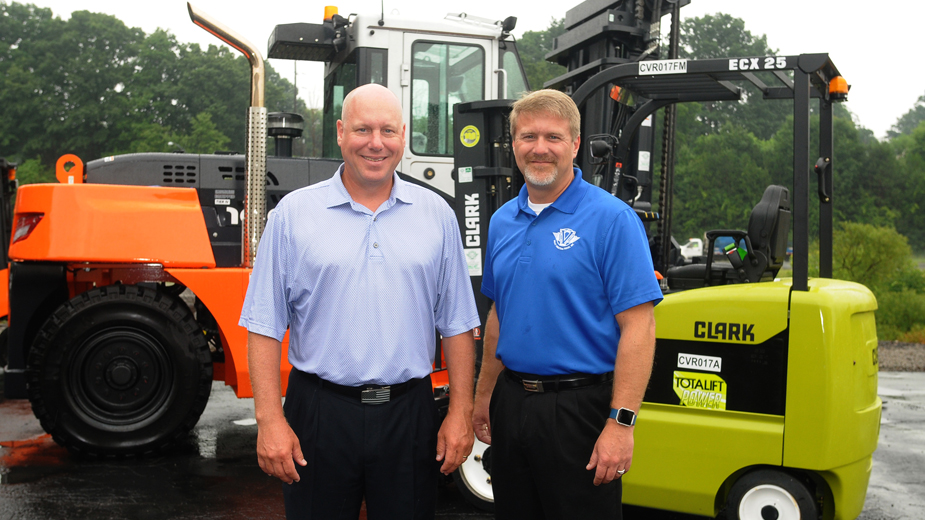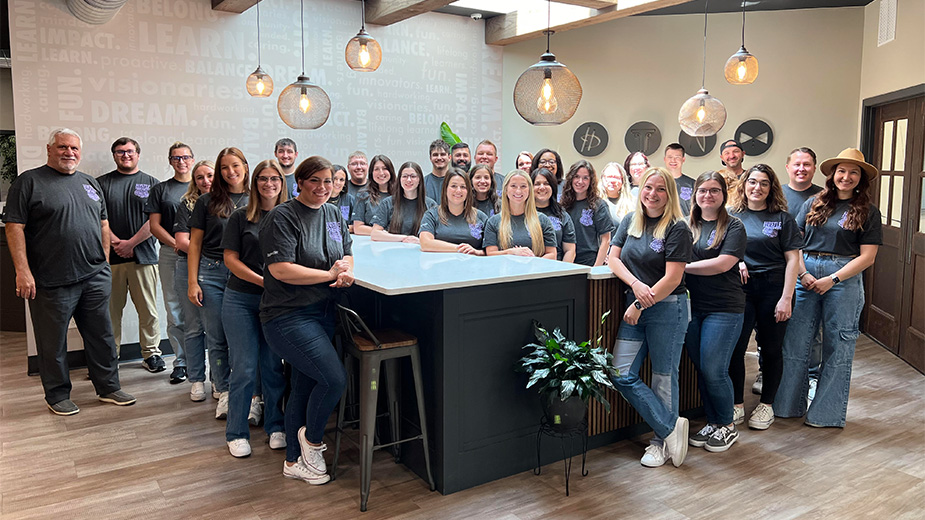Materials Handlers Pick Up, Carry the Load
YOUNGSTOWN, Ohio – Although the materials-handling industry flies under the radar of most consumers, it provides important links in the global manufacturing and supply chain that keep products and commerce on the move. The Mahoning Valley plays a vital role.
Materials handling represents a broad cross-section of the economy, industry specialists say. Everything from conveyors that move components assembled into a final product, processing lines, industrial containers, pallets, forklifts, scissor lifts and packaging operations touch just about every aspect of business in the region.
“The majority of our customers in this region are light-manufacturers,” says Jim Hammond, president of Valley Industrial Trucks Inc. in Boardman. His company rents, leases and sells forklifts, boom lifts and scissor lifts to customers in northeastern Ohio and western Pennsylvania. The company also operates a service department.
“Demand right now is pretty strong,” Hammond says. “I would say our industry is up about 10% and that coincides with what our business is doing.”
Overall, warehousing and manufacturing are busy, but the automotive sector appears to be slowing, Hammond says. Production at General Motors Co.’s Lordstown plant, for example, has been curtailed because of sluggish sales of the Chevrolet Cruze.
Valley Industrial sells and leases Clark, Doosen, Sellick, and JLG brands of lift trucks, Hammond says, noting that advanced battery technology has allowed manufacturers to make the transition from traditional diesel and liquid propane-fueled trucks to all-electric vehicles.
“About seven years ago, I’d say 20% of forklifts were electric,” Hammond says. Today, that mix stands at 60% electric. “With new lithium-battery technology, some of these trucks can run 14 hours on one charge,” he says.
While manufacturers and other businesses look to materials handling to improve product flow, the industry also has a direct impact on the health of employees, says Bill Petro, president of Century-Fournier Inc., Boardman.
“Companies are investing in materials-handling equipment to keep their employees safe and healthy,” he says. Equipment that makes it easier for an employee to perform a task – a lifting device for a packaging operation, for example – allows the worker to be more productive without undue strain on the body, he notes.
With the labor market so tight at the moment, it’s imperative that companies retain the talent they have on the floor, Petro says. “They want to keep employees healthy because they might not be able to replace them. You want to do things to take care of your workforce.”
Century-Fournier supplies a wide range of materials-handling products such as loading-dock equipment, racking systems, industrial storage and conveyance systems. “We’re enjoying a good stretch of business and we’re grateful that we’re busy,” he says.
But to be competitive in the industry today, a company can’t be limited as a supplier or distributor. “The internet has changed things,” Petro says. “We have to be a problem solver, too, not just a supplier.”
That means not only providing the necessary equipment, but also understanding how this equipment integrates into the client’s business. “It depends on what the client needs,” Petro says.
Century-Fournier, for example, works closely with contractors on the installation of docking systems. It has also supplied and helped to build steel mezzanines designed to support small offices that can give managers a full view of a factory floor. “This way, they can be relatively close and accessible to the workforce,” Petro explains. “Material handling is not just all forklifts and storage. Workstations are important and mean a lot.”
Other forklift and materials-hand-ling equipment dealers report that business is on the increase, which principals say often acts as a barometer for how business fares across the country. “We get a good idea on how the economy is moving,” says Carl Stitzel, co-owner of Direct Forklift and Equipment Inc., Boardman.
The company leases forklifts and lift equipment to businesses in this region. It markets lift trucks that have recently come off leases to wholesalers across the country, Stitzel says, and in some cases, outside the United States.
“Hundreds of pieces of equipment come through here, and we offer a service to banking and financial institutions,” adds co-owner Dave Braun. “We’re a good gauge of where the economy is. And right now, it’s looking pretty good.”
Stitzel says that his company’s “bread and butter” remains forklift transactions, but the aerial business – scissor lifts and boom lifts, for example – is the fastest growing segment. “We’re getting more and more from construction as well,” he says.

Pictured: Direct Forklift co-owners Carl Stitzel and Dave Braun.
Recently, Direct Forklift received a large logging lift that sits parked outside the building.
“The cab is 13 feet high,” Stitzel says. “A company in Tennessee wants this.”
Roughly 25% to 30% of Direct Forklift’s business is regional and is conducted through rentals and leases, Stitzel says, while its wholesale division ships across the country and to Canada and Mexico.
“Right now, we have 456 pieces in inventory. It doesn’t sit. It’s always rotating,” Stitzel says. “We’re selling all over the country and exporting, all out of Boardman.”
For those materials-handling companies that serve a broad segment of the manufacturing sector, business appears to be on track compared to last year.
“Some sectors are stronger than others,” says Gary Sharon, vice president at Litco International Inc., Vienna. Litco specializes in manufacturing and supplying molded wood pallets that are especially inviting to distributors and manufacturers that export their products.
Currently, the export market is weak because of the strong U.S. dollar, Sharon notes. However, sales of Litco’s Inca one-piece molded wood pallets are on the increase because it meets the international standards for shipping free of infestation.
“They’re highly resistant to mold while in overseas, high-humidity containers” because the moisture content of the wood is just 8%.
Moreover, clients are opting to ship smaller loads, prompting Litco to manufacturer pallets that range from a full-size 40-by-48-inch pallet to a half-size and quarter-size pallet, he says.
“This leads to saving money, shipping costs and reducing product damages,” Sharon says.
Manufacturers that are experiencing a boost in orders remain reluctant to add more production space, Sharon relates. “Our pallets are very popular for these customers because the nestable feature of a molded pallet allows them to store three times more pallets in the same space and inside the plant,” he says.
The overall constriction of the manufacturing economy has challenged the materials-handling sector, especially those who supply heavier producers such as steelmakers.
“We’re more tied to heavy manufacturing,” says Lee Johnson, president of Melmor Associates, Niles.
For several years, business with heavy industry has declined, he notes, possibly because of the large number of plant closings and consolidations that have occurred across the country.
“We supply the people who manufacture the parts,” Johnson says.
Melmor Associates supplies mostly used materials-handling products –containers, racking systems, motors, conveyors and cranes – for industrial purposes.
The automotive industry, Johnson says, is using less metal in the vehicles made today, thereby reducing its business with Tier II suppliers in that sector.
The company, in business since 1963, has adapted to the market and continues to move forward despite a downturn in the heavy manufacturing sector.
“We’ve developed long-standing relationships with certain companies,” he says. “Plus, I’m not selling a product you need every day,” noting that Melmor’s industrial containers are built to last six to seven years.
“We’ve adapted, we’re still here, and we’re not going anywhere,” Johnson says.
Pictured at top: Valley Industrial Trucks President Jim Hammond and Vice President Mark Evans say most of their business comes from light-manufacturers in the Mahoning Valley.
Copyright 2024 The Business Journal, Youngstown, Ohio.


